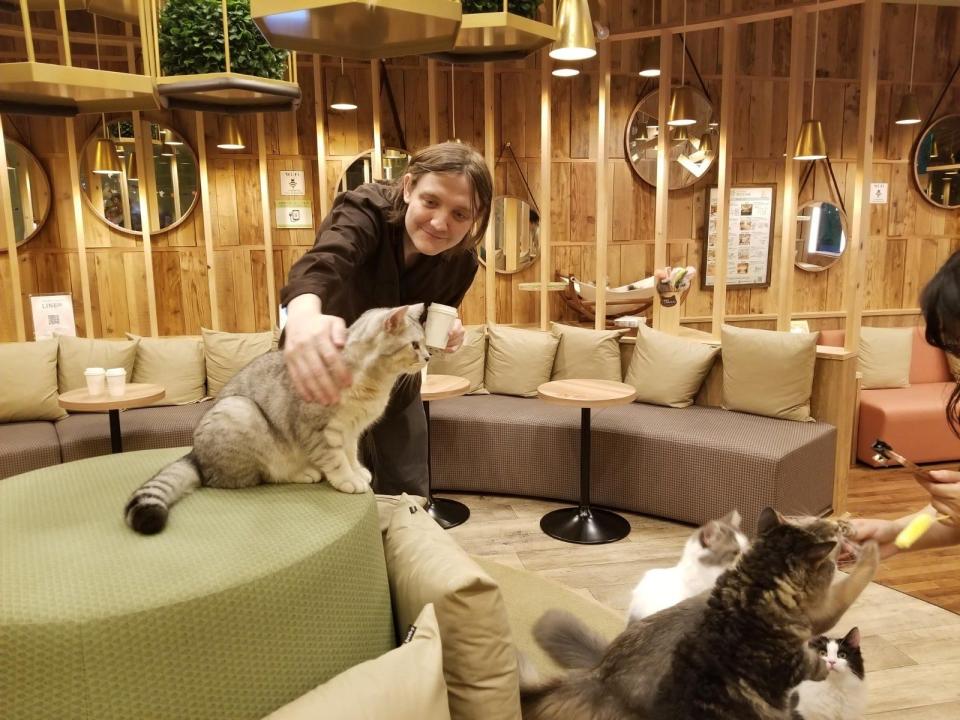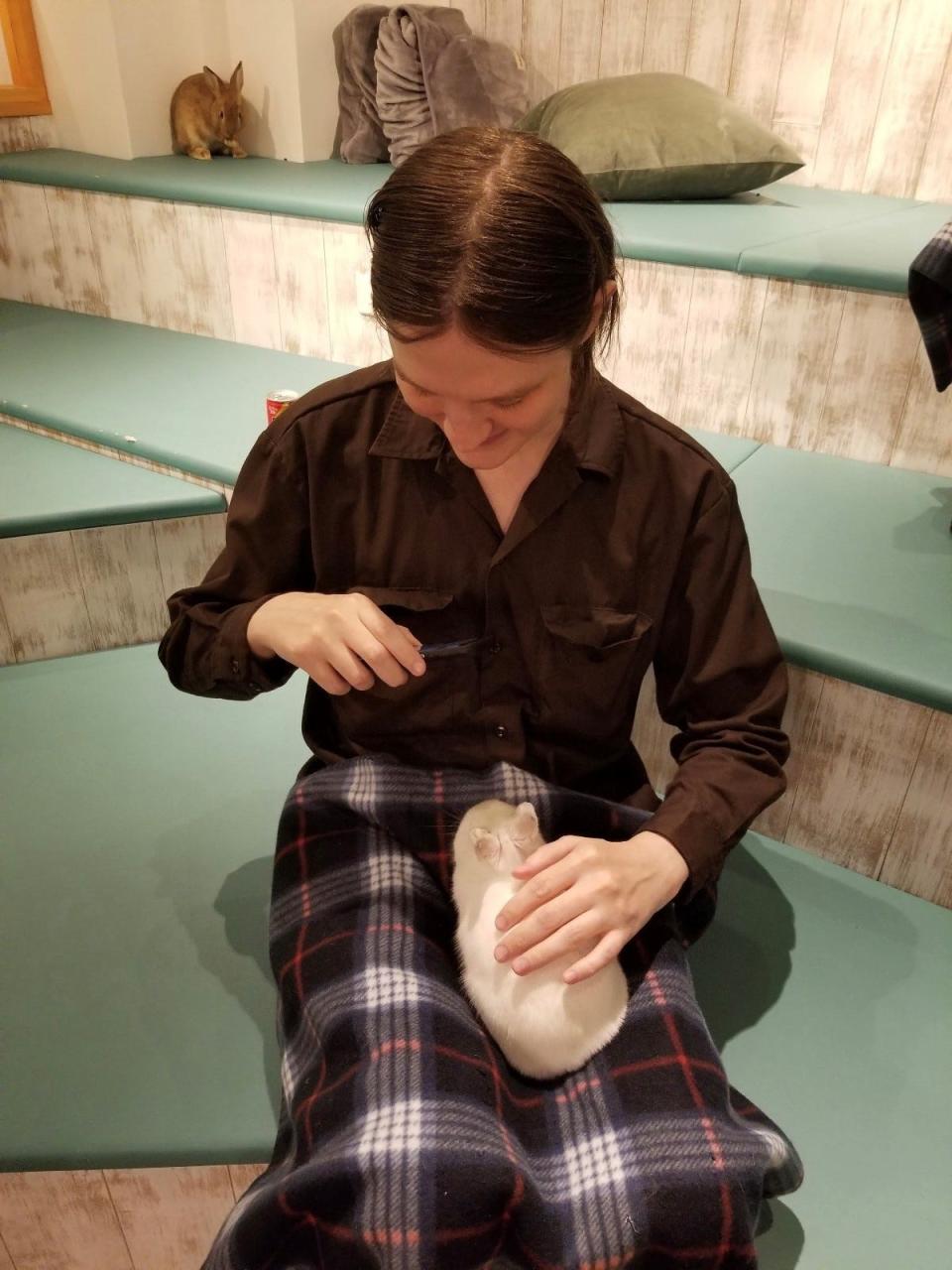'The internet is not a game. ... This stuff really hurts.' Respected developer who was bullied online dies by suicide.
A renowned developer who used the pseudonym Near/Byuu last month posted a Twitter thread excoriating the online forum Kiwi Farms for intense bullying and implied they were going to kill themselves. The thread was shared more than a thousand times and lit up the gaming scene after reports that Near later died by suicide.
Kiwi Farms bills itself as a "community dedicated to discussing eccentric people," though researchers who study extremist communities say it's notorious for degrading and harassing its targets – often those they perceive as deviant and many of whom struggle with existing mental health issues.
Wayne Beckett, founder of Hong-Kong-based Datapower Development, said Near, whose full name was David Kirk Ginder, was an employee and confirmed Ginder's death to USA TODAY. Beckett said Ginder, who identified as nonbinary, shared that they were having trouble with bullying online, though didn't explicitly name Kiwi Farms. Beckett said the company offered to help Ginder, but they said they were handling it.

Kiwi Farms founder Josh Moon posted a statement on his site denying responsibility, and noted in an email to USA TODAY that "there is no evidence of any harassment."
Experts at the American Association of Suicidology say it's impossible to establish a direct link between toxic online cultures and a suicide attempt or completed suicide. But they stress that not enough attention is paid to bullying, harassment and anti-social behaviors online, and how they may increase a person's suicide risk.
Bad behavior often appears in less regulated online forums such as Kiwi Farms, 8chan and 4chan but has seeped into more mainstream platforms, showing up in tweets and direct messages, as well as in comments on news stories.
From heroes to 'all of a sudden ... a villain': How online harassment turned to public health officials
'The bar is low for the social media industry': Top platforms are unsafe for LGBTQ community, new report says
"Toxic online cultures seek to alienate or 'other' certain communities while maintaining exclusivity for the people that gravitate towards them," said Beau Pinkham, chair of the American Association of Suicidology's Tech and Innovations Committee. "When these cultures are weaponized by certain actors to target specific people through doxxing or other methods it can be especially alienating and traumatic for those affected people who once considered the online space a safe area for them."
Ginder wrote in their Twitter thread on June 26 that "every few months, it's something new. A new dox, a new thread, a new tangent."
This isn't the first time Kiwi Farms has been accused of playing a role in a person's suicide. In 2018, a transgender woman died by suicide in Portland, and friends told The Oregonian the victim, Chloe Sagal, was harassed by Kiwi Farms users.
The problem grows
Mainstream media platforms also have a problem with online harassment. Media personality Courtney Stodden said in May that she was harassed on Twitter by Chrissy Teigen. Stodden said Teigen would "publicly tweet about wanting me to take 'a dirt nap' but would privately DM me and tell me to kill myself."
During the pandemic, health care workers tasked with communicating COVID-19 health precautions have been the target of online harassment to the point of driving some out of the workforce. TikTok influencers have spoken out about rampant harassment on the platform, and one creator told BuzzFeed they were told to "commit suicide."
"I'm very very angry – furious with Kiwi Farms," Beckett told USA TODAY. "I just want them to appreciate the gravity of what they've done. They certainly contributed to (Ginder's) death. ... They were quite precious to us. How do you replace the irreplaceable?"
Wonderful tribute to Near in the latest sd2snes firmware. Near had been looking forward to this release as it fixed a very strange bug that was uncovered thanks to their Bahamut Lagoon translation. pic.twitter.com/SXmi00P4eu
— Geriatric Millennial (@NewsFedora) July 11, 2021
Hector Martin, a friend of Ginder's, said Ginder was repeatedly harassed by Kiwi Farms' users on and off the forum, sometimes with comments "along the lines of 'kill yourself,'" though Martin said Ginder was most disturbed by what they claimed were Kiwi Farms' attempts to suicide bait one of their friends.
USA TODAY found a number of posts on Kiwi Farms attacking Ginder and calling them derogatory slurs. After news of their suicide, one user posted, "This loser better have an after party where his family dances over his corpse."
Experts say more research is needed to understand bullying and victimization online.
April Foreman, a clinical psychologist and board member at the American Association of Suicidology, said people who engage in trolling and harassment are also a population at high risk for suicide themselves. From a public health perspective, it behooves prevention experts to better understand the anti-social behaviors at play.
"Sites that ridicule others for entertainment are not great for your wellness. Even if you're not suicidal, spending a lot of time engaged in anti-social behaviors is generally not good," Foreman said.
Sites whose purpose is 'trolling, harassment and very intense bullying'
More than 40% of Americans have experienced online harassment, according to a Pew Research Center survey published in January, and 36% of those who reported severe harassing behaviors said their most recent experience was extremely or very upsetting.
And according to the ADL's 2021 “Online Hate and Harassment” report, 33% of respondents report that harassment was based on their identity.
Not alone: More than half of Americans say they’ve experienced hate online
F-bombs and death threats: Kobe Bryant, Mike Pompeo and the abuse of women journalists
Social media is the most common place of harassment, according to Pew's survey, though experts say it's rife on less mainstream sites such as Kiwi Farms and some of the more well-known "chans," which pride themselves on free speech.
Moon said in his statement in response to Ginder's death that "users on this website are ordinary people who want to watch the trash TV of the Internet. With limited exception ... there is no desire to see people harmed."
When a target to harass is identified on a given forum, experts say often users will troll them on other platforms. Research shows victims of cyberbullying are at a greater risk than nonvictims of suicidal behaviors.
"The purpose of these sites is trolling, harassment and very intense bullying," said Megan Squire, a professor of computer science at Elon University and a senior fellow at the Southern Poverty Law Center.
'This stuff really hurts'
Foreman said people who participate in toxic online communities are driven by complex motivations.
Empathy and compassion responses vary from person to person. People with cluster B disorders – characterized by a disregard for others' feelings and which include anti-social personality disorder and borderline personality disorder – struggle with empathy and perspective and have difficulty with guilt and remorse.
Some people who exhibit a lack of empathy may have a maladaptive response to boredom. Developmental experiences such as abuse can also prohibit people from acting in prosocial ways.
Ginder said in their Twitter thread that they'd been suffering a long time, but Kiwi Farms "made the harassment orders of magnitude worse."
"It's escalated from attacking me for being autistic to attacking and doxing my friends, and trying to suicide bait another, just to get a reaction from me," Ginder wrote. "The internet is not a game. It's real life. I'm a real person. This stuff really hurts."

Pinkham said the language of suicide has long been present in communities online. Acronyms like KYS (kill yourself) are omnipresent, but with suicide baiting, the language is weaponized.
A small study in 2019, "Suicide baiting in the internet era," analyzed 26 suicide attempts in front of webcams and found 42% of audiences baited suicidal people.
Foreman said suicide baiting isn't unique to the internet.
"If you have somebody who is at the top of a tall building and they say they're going to jump and a large crowd gathers, some people will suicide bait," she said. "This isn't even just a digital behavior. This is a human behavior, and that's what bothers me, I think, about some of the really naïve commentary about social media. ... It's as if they think digital behavior is so divergent, and I don't know that you can say that. In real life, people will suicide bait and other people will say, 'Please don't do it.'"
Many users who retweeted Ginder's thread expressed shock, sadness and horror at the pain expressed. Many assailed Kiwi Farms for what they perceived as the site's complicity.
Lauren Alexander, a senior communications manager at Twitter, said "Twitter does not allow people to promote or encourage self-harm on the service." Alexander said Twitter encourages users to reach out to anyone posting about suicide or self-harm directly. If they don't feel comfortable, they can contact Twitter to report threats of suicide.
Martin said many people close to Ginder tried to intervene when they saw their thread, but Ginder was intensely private and few people knew their home address or phone number. No one was able to locate Ginder in time.
A 'bad scene' that needs more study
In Ginder's Twitter thread, they said they "tried everything" to manage their suffering, including medication and therapy.
"The question isn't 'Does Kiwi Farms cause suicide or not,'" Foreman said. "This is a person who may very well have been at risk for suicide, whether we live in the digital era or not," but, she said, "I don't think anyone would disagree that there are some real violations of social norms and social expectations."
Squire said that for those experiencing harassment online, it can be helpful to recognize they are not alone.
"It's a very bad scene, and it needs a lot more study," she said. "I think a lot of people get really worked up about the violent extremists ... but the harassment and trolling aspect of these sites are really harmful."
In Ginder's Twitter thread, they said they hoped eventually Kiwi Farms would be held accountable.
"I pray that someone, at some point, will do something about that website," they said. "There's too many people suffering, and no one seems to care because we are relative nobodies online."
If you or someone you know may be struggling with suicidal thoughts, you can call the U.S. National Suicide Prevention Lifeline at 800-273-TALK (8255) any time day or night, or chat online.
Crisis Text Line also provides free, 24/7, confidential support via text message to people in crisis when they dial 741741.
If you’re experiencing or witnessing online abuse, Pen America's Field Manual offers concrete strategies for how to defend yourself and others.
This article originally appeared on USA TODAY: How toxic online cultures, trolling and bullying contribute to suicide

